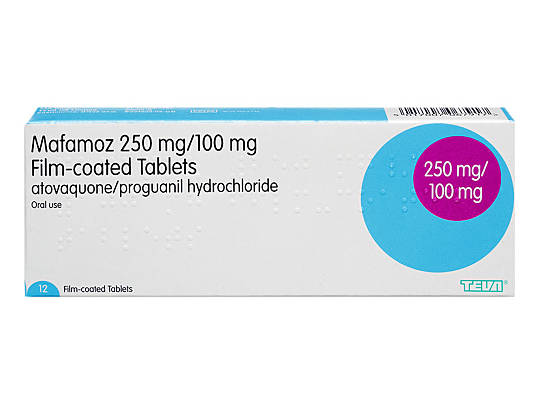Malaria Tablets
Order a prescription for your pharmacy of choice for malaria prevention treatment.
Simply fill in a brief questionnaire. One of our doctors will review your order and prescribe a suitable treatment. How to Order
If you are travelling abroad and need to buy malaria tablets, you can order a prescription for them online at ZAVA, without the need to visit your GP.
You can use the Travel Health Pro website to check whether you need malaria tablets and get more guidance from the HSPC.
To place an order, simply complete our brief medical questionnaire and a ZAVA doctor will then check to see if treatment is right for you. They will then issue your prescription to a local pharmacy in Ireland or choose to have your medication delivered directly to your door.
Make sure you read our general travel advice before your trip.
A consultation for malaria treatment prescription costs €21.50.
Malaria tablets

No results found.
Please check your spelling or try another treatment name.



Malaria Tablets
What is Malaria?
Malaria is a serious illness caused by a parasite, Plasmodium, carried by the female Anopheles mosquito. It is transmitted to humans when bitten, infecting the body’s red blood cells. Although malaria can make you very ill with high fevers, muscle ache, and flu-like symptoms, and in serious cases can lead to death, in most cases it is preventable and treatable. You can protect yourself when travelling by taking appropriate antimalarial medication and avoiding mosquito bites.
How can I avoid getting malaria?
Malaria can be avoided – Public Health England have published an ABCD approach to prevention:
- Awareness of risk: seek advice to find out whether you are at risk of malaria and the things that affect your risk (Travel Health Pro)
- Bite prevention: avoid getting bitten by mosquitoes by using DEET based insect repellents, sleeping nets, and clothing that covers your arms and legs, especially between dusk and dawn
- Check if you need antimalarial tablets on the Travel Health Pro website. If you do need antimalarials make sure you have the right tablets and the correct number to finish the course
- Diagnose quickly and without delay: if you think that you might have malaria even up a year after your travel, seek immediate medical advice
Malaria tablets as prevention
If you are travelling to an area with a high risk of getting malaria, you should take a course of antimalarial tablets. It is important to research where you are going, to see which tablets are effective in that region. As no antimalarial tablets are 100% effective, it is also important to take measures to avoid being bitten.
There are different types of antimalarial tablets:
Malarone (Atovaquone-Proguanil): one tablet once a day starting 2 days before you go, during your stay and for 7 days after you return.
Doxycycline: one tablet once a day starting 2 days before you go, during your stay and for 4 weeks after you return.
Lariam (Mefloquine): one tablet taken once a week starting 3 weeks before you go, during your stay and for 4 weeks after you return.
What are the symptoms of malaria?
The symptoms of malaria include:
- fever
- headache
- vomiting and diarrhoea
- flu-like symptoms such as sweats, chills, muscle ache or feeling unwell
The time from being bitten to when symptoms of malaria start is called the incubation period. This is normally 7–18 days and depends on the specific parasite you are infected with. In some cases it can take up to a year before symptoms appear. Often the early symptoms of malaria can be quite mild and hard to diagnose.
With some kinds of malaria, you might notice that the chills and fever run in a 48-hour cycle. The pattern is often cold/shivering followed by fever and severe sweating and fatigue. If you have been to a high malaria risk area and develop these symptoms, see a doctor straight away (even if it was up to a year after your travel). The most serious type of malaria is called Plasmodium falciparum malaria, and this can cause life-threatening illness, as you can get very seriously ill, very quickly.
What are the causes of malaria?
Malaria is caused by a parasite called Plasmodium carried in the female Anopheles mosquito and transmitted to humans through the mosquito bite. When an infected mosquito bites you, it injects the plasmodium parasite into your bloodstream. If a mosquito bites someone who is infected with malaria, the mosquito can get infected too and pass the parasite onto other people.
When a person is infected with the plasmodium parasite by a mosquito, the parasite travels through the blood to the liver, where it develops. The parasite then travels back through the bloodstream and invades the red blood cells, where it grows and multiplies. At set time intervals (usually every 48–72 hours) the blood cells that are infected burst and spread more parasites into the bloodstream. When the blood cells burst, the person will experience fever, chills and sweating.
There are different types of plasmodia parasites, but only five of them can cause malaria in humans:
- Plasmodium falciparum: mostly found in Africa, causes the majority of malaria fatalities worldwide
- Plasmodium vivax: usually found in Asia and Latin America. The symptoms are less severe than those of plasmodium falciparum, however it can remain in the body (the liver) for up to 3 years, and this can result in a relapse
- Plasmodium ovale: unusual, normally found in West Africa, and can remain in your liver for years without producing symptoms
- Plasmodium malariae: quite rare, generally only found in Africa
- Plasmodium knowlesi: very rare and found in parts of Southeast Asia
How is malaria diagnosed?
Visit your doctor/nearest hospital/travel clinic if you develop the symptoms of malaria. They will test for it by looking for the parasite in your blood sample. You can get checked while you are away if you start to feel ill before you get home. Do not wait, as the quicker you start treatment the speedier your recovery will be.
Some types of malaria can take up to a year to develop, so see your GP and let them know you have been to a malaria endemic area if you start to develop symptoms, even if you have been back home for a while. If your GP wants to test for malaria, they will probably send you to your local hospital to have the blood test. You should get the results the same day. If you need treatment, it will start straight away.
Malaria treatment
Antimalarial tablets are used to treat malaria as well as to prevent it. If someone is very seriously ill with malaria, antimalarial drugs can be given intravenously, through a drip that goes into a vein in their arm. While some of the medications used to prevent malaria can sometimes also be used for treatment (for example at higher doses or in combination), other medications are usually recommended. These could include Artemether with lumefantrine or quinine.
There are four main types of anti-malaria tablets to prevent malaria:
- Atovaquone plus Proguanil (Malarone)
- Doxycycline
- Chloroquine plus Proguanil
- Mefloquine (Lariam)
If you are pregnant or breastfeeding
If you are pregnant or trying for a baby, it is advisable to avoid travelling to areas with a high risk of malaria. Pregnant women are at a higher risk of developing severe malaria due to the changes in the body’s physiology, so they could develop dangerous complications.
If you do have to travel to a malaria endemic area, please consult with your doctor about the best antimalarial medication to take.
Doxycycline is not recommended for pregnant/breastfeeding women because it can harm the baby.
Usually, atovaquone and proguanil (Malarone) is not prescribed during pregnancy or breastfeeding because their effects on mother and baby are not known. However, if there is a high risk of malaria and there is no other better alternative, your doctor might recommend you take them.
Do I need a prescription?
In Ireland, chloroquine and proguanil can be bought over the counter from pharmacies, but all other antimalarial medications need a prescription. Speak to your pharmacist, doctor or travel nurse for the best option for you.
How does malaria medication work?
Antimalarial medications work by interfering with the malaria parasite’s life cycle in the body. Some antimalarial medications interfere with how the parasite develops within the liver and prevents it from multiplying and invading the red blood cells. This is how malarone works.
Other antimalarial medications stop the parasites from multiplying within the red blood cells and prevent illness. This is how doxycycline works, which is why it needs to be taken for four weeks after leaving the malaria area to ensure it effectively kills all the parasites.
Atovaquone plus proguanil (Malarone)
When used as an antimalarial the dose is one tablet daily (contains 250mg of atovaquone and 100mg proguanil). You should start taking them 1–2 days before you enter the malaria endemic area and continue to take them after you return for a further 7 days. So, if you were going on a 7-day trip you would take 16 tablets (2 before you go, 7 whilst on your travels, and another 7 when you return).
Take the tablet with food, and if you miss a dose or vomit within one hour of taking it, take another dose and carry on with the course.
Malarone side effects include stomach upset, diarrhoea and headaches. It can also interact with certain other medications such as tetracycline antibiotics, rifampicin, rifabutin and metoclopramide.
It is important to let your doctor know about any medications you are taking so they can ensure the tablets are safe to take.
Doxycycline
When used as an antimalarial the dose is one tablet daily (contains 100mg of doxycycline). You should start taking them 1-2 days before you enter the malaria endemic area and continue to take them for 4 weeks after you return. So, if you were going on a 7-day trip you would take 37 tablets (2 before you go, 7 whilst on your travels and another 28 when you return).
Take the tablet with food at the same time each day. If you miss a dose take one as soon as you remember and then carry on with the course. To avoid irritating your stomach, try to stay sitting or standing for at least 30 minutes after you have taken it.
Side effects include heartburn, nausea, diarrhoea, thrush, headaches and sensitivity to the sun. It can also interact with other medications such as retinoids (for psoriasis) or cyclosporin so let your doctor know which medications you are currently on.
Active ingredient
Doxycycline.
How to take it
Take one tablet per day starting two days before your travel, and every day you are in the area. Continue for 4 weeks after you leave the area. Take your tablet with a full glass of water and sit up for 30 minutes afterwards. Try taking it with meals if you experience any gastric symptoms.
Risks
Always take the tablet with food and avoid lying down for at least 30 minutes. It is not recommended for pregnant or breastfeeding women. It is not suitable for those who are allergic to tetracycline antibiotics or who have liver/kidney problems.
Side effects
These include sunburn due to sensitivity to light (sun exposure should be avoided as far as possible), stomach upset, heartburn and thrush.
Malarone / Generic Malarone
Active ingredients
Both Malarone and generic malarone work in the same way and contain the same active ingredients, atovaquone and proguanil. Generic malarone is a generic (non-branded medication) and it is available at a lower cost.
How to take it
Take one tablet per day starting two days before you travel. Take your tablet every day you are in the area and continue for 1 week after your return.
Risks
It is not recommended for pregnant or breastfeeding women. People with severe kidney problems are also not advised to take it.
Side effects
May include intestinal upset, headaches, skin rash, difficulty sleeping, strange dreams, depression, and mouth ulcers.
Lariam
Lariam is not recommended if you have epilepsy, seizures, depression or other mental health problems, or if a close relative has any of these conditions. It is not suitable for people with severe heart or liver problems.
Side effects include dizziness, headache, sleep disturbances (insomnia and vivid dreams) and psychiatric reactions (anxiety, depression, panic attacks and hallucinations). It is very important to tell your doctor about any previous mental health problems, including mild depression. Do not take this medication if you have a seizure disorder.
Malaria guidelines
Malaria guidelines are regularly updated, and countries receive new risk ratings for malaria. As a result, some of the malaria risk advice on our site may be out of date. Before starting your assessment for malaria treatment, do check Travel Health Pro guidance on the malaria risk in the country you are travelling to.
Neither the content on our website, nor our online assessment for malaria treatment, is intended as a substitute for a full travel consultation. It is important you discuss all precautions recommended for your trip with your GP or travel specialist. For example, you may need vaccines as well as malaria treatment.

Dr Clair Grainger studied at The University of Edinburgh from 2004 to 2009. She's worked in hospitals throughout Edinburgh and London before completing her GP training in North Middlesex Hospital in 2017.
Meet our doctorsLast reviewed: 08 Jan 2021






